Hug, Soldiers’ Stories Tug on FIDF Hearts
The organization raises more than $750,000 during its biggest gala yet in Atlanta.
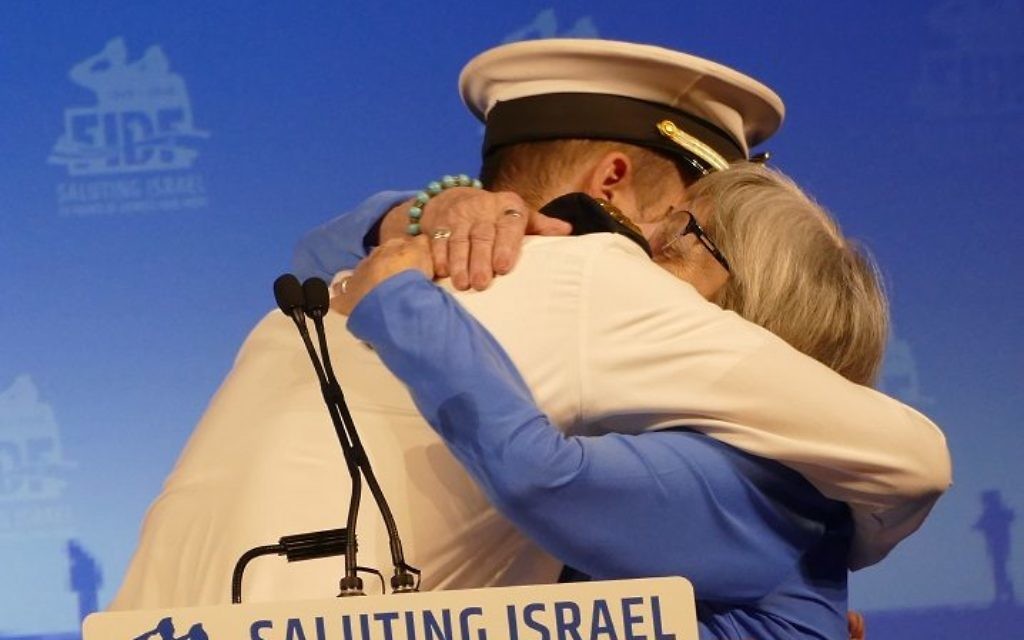
A hug between an Israeli navy officer and his grandmother sent a powerful message at the Friends of the Israel Defense Forces gala Monday night, May 14, at the InterContinental Buckhead Atlanta.
That sailor, who can be identified only as Capt. Y for security reasons, helped bring a German-built submarine home to Israel — a difficult assignment because his Polish grandmother, Judith, nearly died in the Holocaust.
As Capt. Y recounted, she survived in part because a German soldier let the little girl and her mother go during an escape. But he did so out of spite, not mercy, saying Hitler would be sure that no Jews were left on Earth.
Get The AJT Newsletter by email and never miss our top stories Free Sign Up

Judith traveled from Israel for the FIDF gala, held on the 70th anniversary of Israel’s Declaration of Independence, and joined her grandson onstage for a presentation of IDF@70 pins and flowers by uniformed IDF soldiers to the Holocaust survivors in the room.

“I am so excited to see a room filled with IDF supporters and also the soldiers in uniforms, sending a clear message, ‘Never again,’” she said, embracing Y in front of more than 575 people, a record crowd that raised more than $750,000 for the organization, founded in 1981 by Holocaust survivors.

“FIDF was their way to provide humanitarian support to thank the IDF combat soldiers for their sacrifice,” said Garry Sobel, FIDF’s Southeast chairman and a national board member. “And make no mistake: It’s the IDF soldiers that ensure that when we say never again, we mean never again.”

FIDF’s CEO, Maj. Gen. Meir Klifi-Amir, sent a similar message to an earlier VIP reception.
“We have one of the best militaries in the world with the highest morals in the world. … Without a strong IDF, we cannot exist,” he said, adding that a second key to the amazing country Israel has built in 70 years is its strong bond with the United States.

The bond was exemplified by the opening earlier that day of the U.S. Embassy in Jerusalem. Klifi-Amir called it one of the happiest days of his life, and he praised President Donald Trump for taking an action that Presidents Bill Clinton, George W. Bush and Barack Obama had deferred every six months for two decades.
“Today, I’m a proud Israeli. I’m a proud Jew. I’m a proud general,” Klifi-Amir said.

Georgia Gov. Nathan Deal, who did not attend the main gala but spoke at the VIP reception, added his praise for Trump’s political courage and his pleasure at seeing many young people in the military uniforms of the United States and Israel.
They included two of Atlanta’s 30 current lone soldiers: Cpls. Daphna Kadosh, an artillery instructor, and Zachary Olstein, a combat engineer. During the gala, both thanked FIDF and the crowd for helping them serve the Jewish people and for flying them home to visit their families.

Referring to the violence that day on the Gaza-Israel border that resulted in 58 Palestinian deaths and wide condemnation of Israel, Deal offered support for the IDF in what was “certainly a rough day. … But that is to be expected, I suppose.”

Rep. Brian Mast (R-Fla.), a double-amputee Army veteran of Iraq who volunteered with the IDF in 2015 before his election to Congress in 2016, said the lesson on the Gaza border was that the quest for peace shouldn’t involve giving up your ideals.
“Today is just that perfect example that we are not going to surrender who we are,” he said. “We are going to acknowledge what the truth is. … We will not surrender to the whim of everybody else.”
Rabbi Natan Trief’s tale of not surrendering involved his fight to enlist in the IDF as a lone soldier at age 29. He wound up serving in a combat unit specializing in search and rescue during Operation Cast Lead in Gaza in 2009.

“Serving in the IDF was by far the hardest thing I’ve ever done in my life and, yes, by far the most meaningful,” said Rabbi Trief, the husband of Temple Sinai Rabbi Samantha Shabman.
His service was a prelude for the story of Lt. Shlomo, who served in Gaza during Operation Protective Edge in 2014.

He told of going into a terrorist tunnel in the futile hope of rescuing three soldiers who had been ambushed and killed; the body of one of them is still held by Hamas.
Shlomo and another soldier who volunteered to join him were walking through the tunnel and shouting to prevent fellow Israelis from shooting at them. “I knew that if there was a terrorist waiting for us, he could take action and kill me,” Lt. Shlomo said. “I was just hoping that the second soldier behind me could respond fast enough to protect himself.”
The tunnel was wired with explosives every 100 to 200 yards. “I was sure that I was going to die in that tunnel, but the only thing I could think of was preventing Hamas from kidnapping my fellow comrades, my brothers, my friends.”

He survived to become a recipient of an FIDF Impact scholarship, a program that pays for college and requires its military-veteran recipients to do 130 hours of community service per year. Since the program launched in 2002, Sobel said, 13,500 Impact recipients have performed more than 5 million hours of service, making it the largest community service program in Israel.
Sobel announced that after the recipient of his Impact-funded scholarship graduated — asking him to “please stay in my life” — he was renewing his $4,000-per-year support for the program and urged others to do so as well.
Mast said he saw the dangers Israel faces during his service in the Middle East, but his decision to find a way to do something to show support for Israel and the IDF came in 2014 while he was studying at Harvard after his military service. People protesting Israel’s war in Gaza turned on him as a military veteran — “I usually wear a ball cap that says ‘Army Rangers,’ and most people can see I don’t have any legs” — and harassed and cursed him and his wife.

“They were there because they wanted to protest Israel, and they made that jump, having nothing spark them to do so, to protesting a service member of the United States military,” Mast said. “That’s their shared hatred for those values that we share, the United States of America and Israel. And that’s their shared disdain for the things that we go out there and represent to the world.”

Among the many dignitaries in the gala audience were Republican Congresswoman Karen Handel, who will face one of four Democrats in November, and three Israeli consuls general to the Southeast: Ambassador Judith Varnai Shorer, who holds the post now, and her two immediate predecessors, Reda Mansour and Opher Aviran.
Photos by Michael Jacobs
-
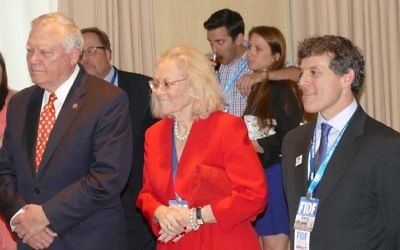
- Georgia Gov. Nathan Deal, Israeli Consul General Judith Varnai Shorer and FIDF Southeast Chairman Garry Sobel listen to remarks by Maj. Gen. Meir Klifi-Amir.
-
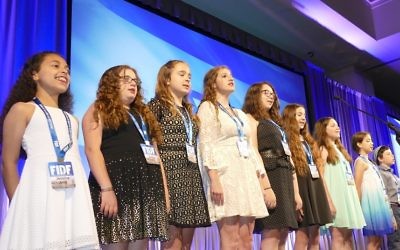
- Epstein School students, including Garry Sobel’s saughter, sing “Hatikvah” after singing “The Star-Spangled Banner” to open the FIDF gala.
-
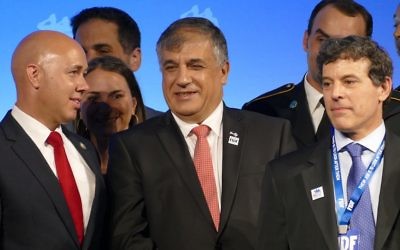
- Brian Mast, Meir Klifi-Amir and Garry Sobel stand among the soldiers and other dignitaries onstage at the end of the FIDF gala.




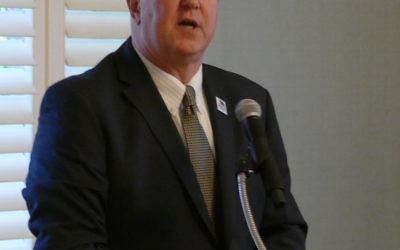
comments